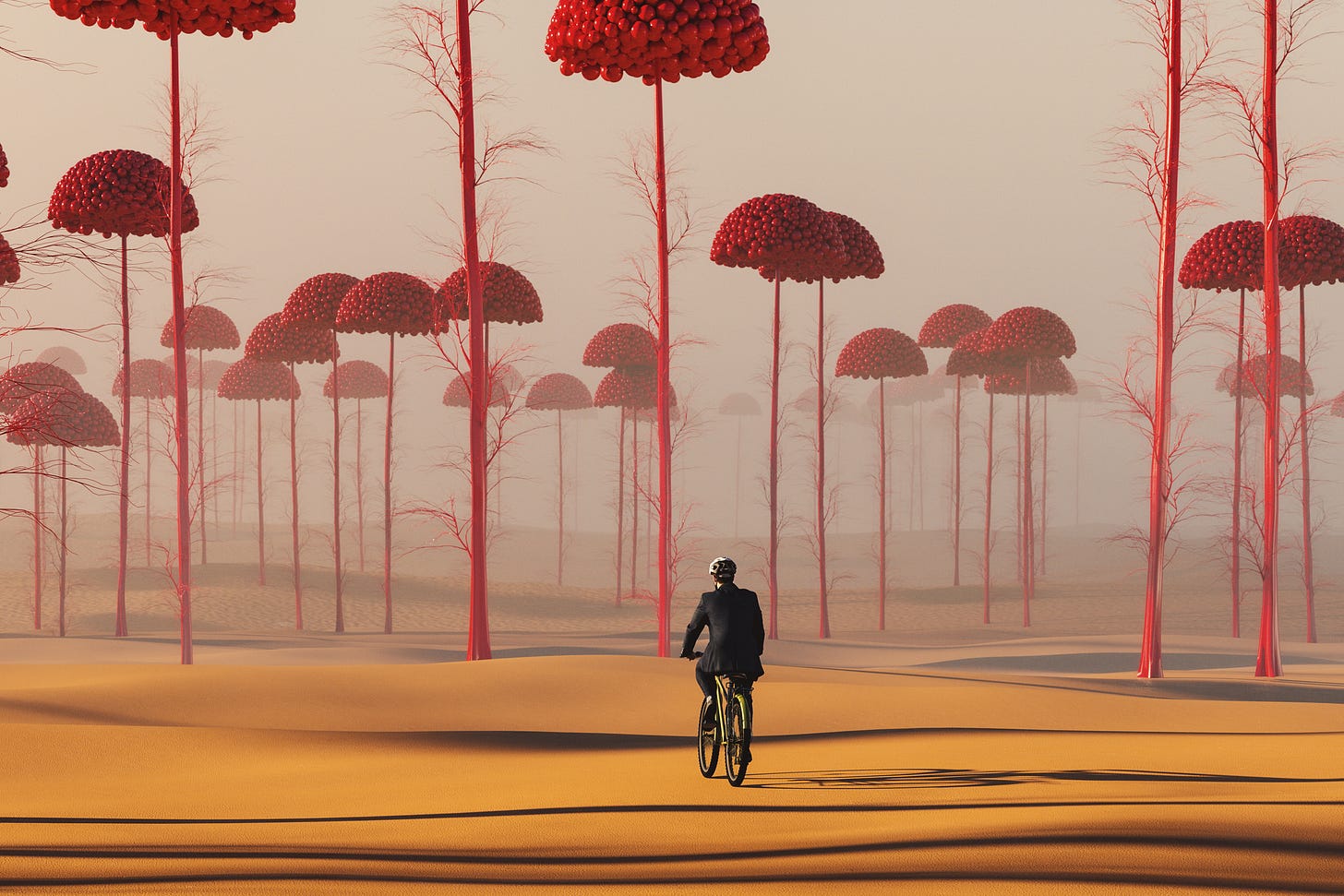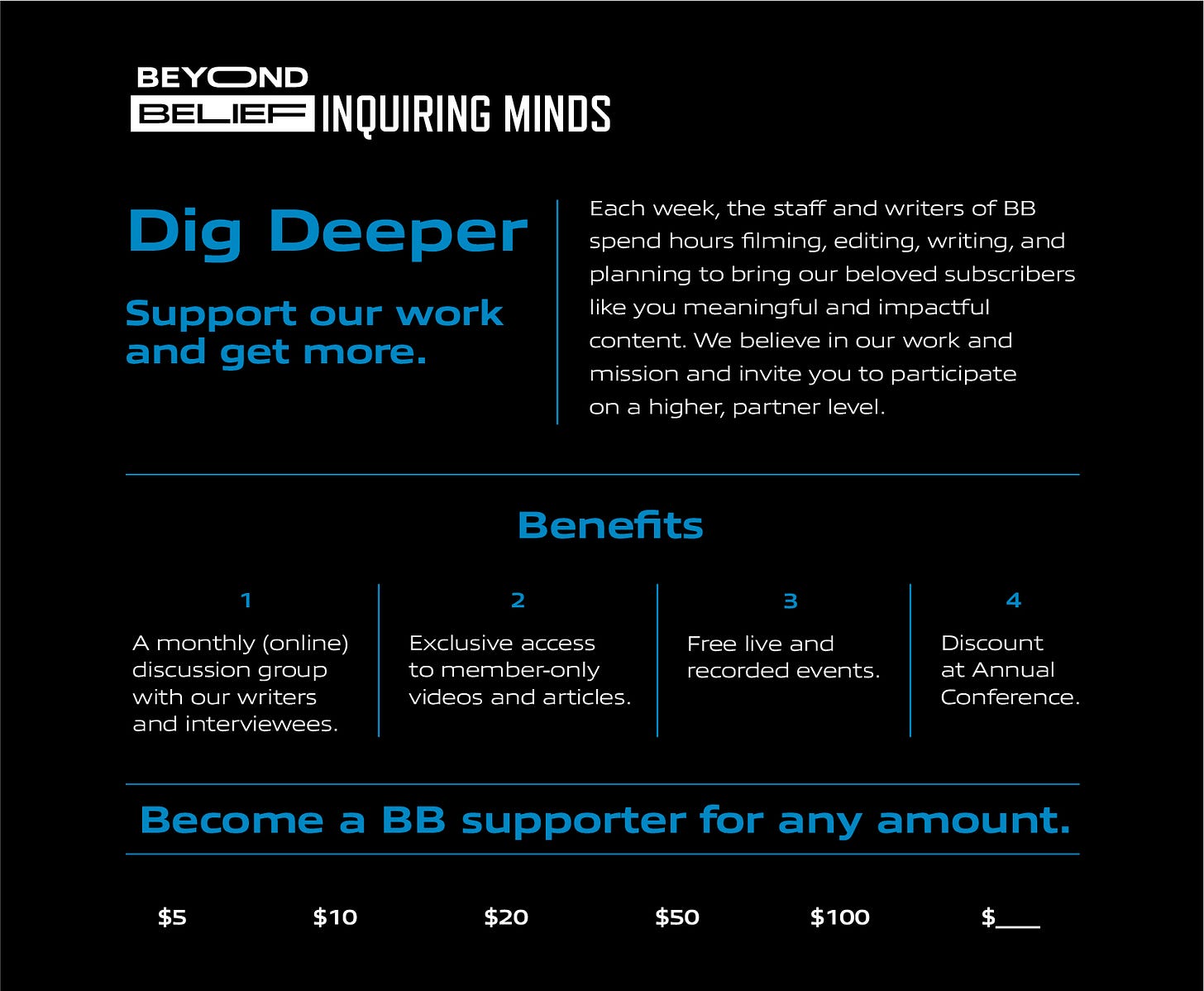Escape From Normal: Part I
On The Dreamlike Elements of Creativity
Once upon a time, there was a crooked tree and a straight tree. And they grew next to each other. And every day the straight tree would look at the crooked tree and he would say, "You're crooked. You've always been crooked and you'll continue to be crooked. But look at me! Look at me!" said the straight tree. He said, "I'm tall and I'm straight." And then one day the lumberjacks came into the forest and looked around, and the manager in charge said, "Cut all the straight trees." And that crooked tree is still there to this day, growing strong and growing strange.
— Tom Waits
I’ve often wondered how it is that we continue to stop for red lights, how in a society that sees freedom as its defining value we continue to obey rules We all know reflexively that red means and stop green means go.
And sure, most of us don’t want to die.
Most of us want to avoid getting a traffic ticket or spend money for no good reason.
Most of us want to be sensible, rational people.
Most of us agree that imperatives are a good thing, a net positive.
I do too. It’s very good, all that rationality. But too much rationality is a hindrance when it comes to writing songs.
Tabula Rasa
We were born without names for anything. We were born into a world of unknowing, of pure irrationality, screaming and pissing, and crapping on ourselves. We were born without etiquette, without self-control, thinking only of ourselves, and constantly demanding attention. That’s how we survived. That’s how we made ourselves known. And slowly, as we grew, most of us learned how to sublimate our desires, how to behave, how to think and behave rationally. The goal, among other things, was to become normal.
At around five or six years old, it began to feel painful, frightening, not to be seen as a normal person. And so, I learned to become like everyone else. I learned how to count, how to read, how to stand in line, how to draw a circle and a square, and how to use a fork and knife. I learned what words were appropriate, what tone of voice was acceptable. I also discovered the rewards of success and the pain of failure. And so, began my race. The tireless, endless race to the top of something I could never quite define.
I’m not talking about un-learning normal, so much as learning to appreciate what lies beyond the realm of your own normal. To properly evince your creativity —read: your unflinching, unmitigated humanity —you must create doorways of access for yourself, portals of escape from your self-projected public-facing self so that you can —occasionally— bask in the essence of who you really are. That’s where your songs will come from, your best ones.
Who are you beyond the trappings of what’s considered normal? What are the emotions you contain that cause you to:
laugh aloud,
to dance,
to scream
to be silent
to pray
to reach out with a desperate need for connection,
to desire the heat of sensual touch,
to roll up into a fetal ball and weep as you once did before you learned
to live like everyone else does.
Dream a Little Dream
Don’t be alarmed. None of this is foreign territory for you or anyone else. You journey there every night when you dream.
You may be a copywriter for a well-known advertising firm, you may be a commercial pilot, a mail carrier, a soldier, a dedicated son, a mother, a shepherd, or an Uber driver — each of those roles require that you act in a certain way, that you respond in a predictable, normal manner. Yet each night the copywriter leaves her circumscribed world.
Last night I was flying in the dark, half-dressed on the back of a giant raptor. I was singing a song that my mother would sing to me when I was a little girl, a song that I hadn’t thought about in years.
The commercial pilot, a former military man, in many ways rigid in his thinking, had been dreaming about chocolate cake. A birthday cake.
I was attempting to blow out the candles. But each time I blew, the candles would roar into tremendous spires of flame. I woke up trembling.
The mail carrier, the soldier, the shepherd, and the Uber driver all had similarly strange dreams; each of those dreams carrying them outside the narrow circle that in waking, they’d been acculturated to remain inside.
Every good songwriter knows where their exit ramps are, where their doorways leading out of normal are.
It isn’t so much the “skill” of writing songs that makes them special. Although mastering the skills of songwriting is, indeed, critical—it’s those escape hatches, which lead them to places most of us don’t know are accessible.
The Deep Implications of “Landing”
The plane is about to land. It’s turbulent and you feel the cabin rocking from side to side. You tighten your seatbelt. Outside your window is a river, which is partly hidden by scattered clouds. “We’ll be landing shortly,” you hear a woman say. Landing is a very particular thing, a very specific idea. At this moment, landing refers to the plane touching down safely on the tarmac. But landing has far deeper implications. You are up, soon you will come down. You are high, soon you will be low.
Being up in the air denotes a sense of uncertainty. Getting one’s feet back on the ground denotes a sense of normalcy and assuredness. We prioritize the latter too often. We mistake uncertainty for danger and normalcy for certainty. Could it be that we spend too little time in a state of uncertainty, convincing ourselves that getting “back down” should always be a priority? What if down isn’t certain at all? What if down is a place of paucity, restlessness, and stagnation? You and I both should strive to avoid our desire to land as often as we do.
The purpose of the songwriter is to take people from the ground and move them into the air. If they’re in the air, it takes them down to the ground. Change vantage points, change perspectives. Within those opposing frames we begin to see life as an interrelated wholeness. A Oneness wherein everything is seamlessly connected with every other thing. It’s the beauty of bringing together what were previously assumed to be desperate pieces.
For the moment.
Completeness.
A puzzle assembled.
EMAJIN All the People
Flying above yourself and seeing the world from there is a natural thing. It’s more unusual than standing on the ground, but no more miraculous. There’s this thing, this mostly untapped human resource —at least, among people older than say, eleven years old. It’s called EMAJINAYSHUN.
Doesn’t the word look better like that?
It’s not as familiar. It’d be best to change it up every couple of months or so. That way we wouldn’t see it as plain old “imagination.” We could then bestow upon it the incredibly important and dynamic human/soul/magic power it deserves.
EMAJIN yourself flying above the surface of the Earth and you’ll be there. It’s not hard. Any four-year-old can do it. We all did it at some point. It’s just that most of us stopped doing it because we were instructed to see it as less important than memorizing multiplication tables or the capitols of American cities.
After you’ve mastered the art of flying above the earth —which should take you exactly zero seconds —EMAJIN yourself becoming so small that you’re able to go inside things. What does the inside of a ketchup bottle look like? What does it smell like? Pick anything: the inside of a snake, the inside of a rock, a human heart, a drop of water. Then, when you’ve gotten the hang of the physical stuff, go inside emotions and intellect. Where do they exist? Does it matter? It does not. Just go there. Be there.
What does it feel like to be inside the mind of a woman whose husband left her for another?
What does it feel like for a man to hold his newborn daughter for the first time?
What does it feel like to dream the dreams of a man on death row,
or to think the thoughts of a child who sees the stars for the first time?
You can’t write about things you haven’t felt. But you can write about what you’ve felt through your imagination.
Roll in the snow, stick your hands inside the stomach of a fish. Go to a children’s hospital and play music for the kids. Hold the hand of a friend who’s desperately lonely. Listen to Dvorak. Write a letter to your mother. Improvise a song about your dead father — don’t stop to judge if it’s good or bad. Eat an apple: stem, core, seeds and all. Pee outside under the moonlight. Pretend that you’re an owl. Tell someone how much you love them. Tell someone who’s been cruel to f*ck off. Pray for your children, pray for the woman who sleeps in the alley, surrounded by her worldly possessions. Paint a watercolor portrait of your friend and send it to her with a love note.
The chattering mind.
The dreaming mind.
The judgmental mind.
The intellectualizing mind.
Set them all free!
I don't try to think of them. I wait till they come. A metaphor may be that if you're trying to catch a rabbit, you don't wait right by the hole … And then the rabbit comes out of the hole, he looks around. You start talking to the rabbit, but you're not looking at it. Ultimately the rabbit is friendly, and the song is born. The idea is, he's free to come, free to go. Who would want to intimidate or disrespect the source of the rabbit? And in that way, if the song happens, it happens. If it doesn't happen, it doesn't happen. It doesn't matter.
— Neil Young
Check out Peter’s book on creativity: Let Me Out: Unlock Your Creative Mind and Bring Your Ideas to Life







